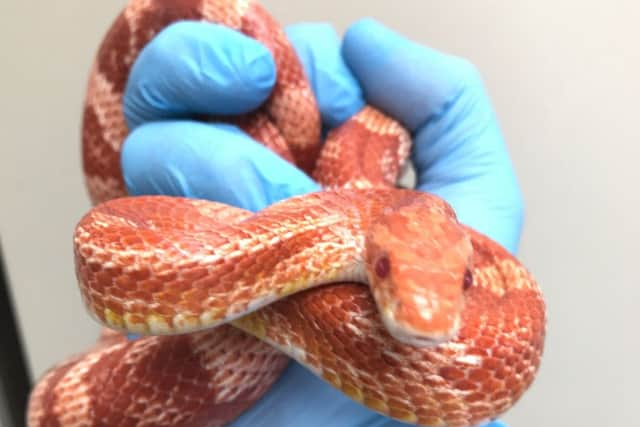This exotic pet was found dumped by the roadside in Crawley
and live on Freeview channel 276
The RSPCA received a call from a concerned member of the public who had found it in the Lark Rise area.
RSPCA Inspector Tony Woodley was called to collect the snake which was abandoned in a home-made vivarium.
Advertisement
Hide AdAdvertisement
Hide AdHe said: “We are grateful to the caller for contacting the RSPCA and keeping the snake safe until I arrived.


“This was a corn snake and he was was found in a completely unsuitable vivarium and, had the snake not been found, it’s likely he would have died from the cold.
“Once the snake was taken into RSPCA care he was then transferred to a specialist centre and when ready, efforts will be made to find him a new home.”
Mr Woodley said the RSPCA was concerned about the welfare of reptiles and other exotic animals kept as pets.
Advertisement
Hide AdAdvertisement
Hide AdIt rescued more than 4,000 exotic animals in 2018, including 500 snakes, 300 turtles, 145 bearded dragons, five raccoon dogs, four marmosets and a wallaby.
Officers rescued 39 exotic animals in 2018 in West Sussex.
More news:
Advertisement
Hide AdAdvertisement
Hide AdMr Woodley said: “Reptiles and other exotic pets are completely reliant on their owners to meet their welfare needs including requiring the correct levels of heat, light and humidity, plus an appropriate diet.
“Some species can grow very large, live for a long time or require a licence or paperwork to be legally kept or sold.
“Many of the animals we’re called to help are found stray outside, where they can very quickly suffer in the cold.
“These animals are commonly found for sale in pet shops and are advertised online. In the past, animals have often been handed over to buyers with little or no information about how to care for them properly, although new regulations in England should improve this.
Advertisement
Hide AdAdvertisement
Hide Ad“In some cases, we believe owners take them on simply because they believe they will be easier to care for than other pets, but it is essential that people research what is required in the care of their pet, including food, equipment, environment and vet care, before taking one on. We would also urge them to ask for help if they’re struggling to meet their needs.
“We believe that people may buy them with little idea of how difficult they can be to keep and the animals are sometimes neglected when the novelty wears off and the commitment hits home. This is why we would encourage anyone thinking of getting an exotic pet to find out as much as possible about the animal’s needs and whether they’re the right pet for them.”